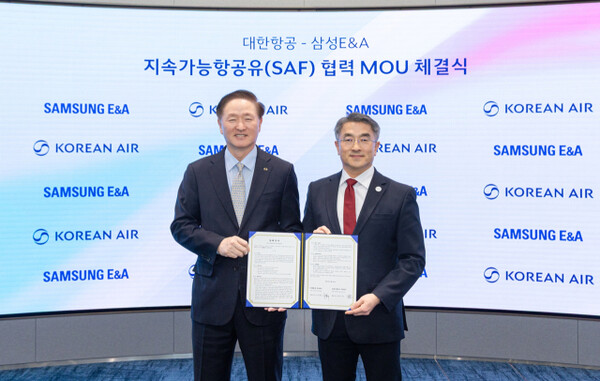Companies Sign MOU for Sustainable Aviation Fuel Production and Supply Chain

Samsung E&A and Korean Air will collaborate to enter the U.S. sustainable aviation fuel (SAF) market.
Samsung E&A and Korean Air announced on Nov. 21 that they signed a memorandum of understanding (MOU) for SAF cooperation on Nov. 20. The signing ceremony was attended by key officials from both companies, including Samsung E&A President Namkoong Hong and Korean Air Vice Chairman Woo Ki-hong.
This agreement encompasses discovery and review of overseas SAF production projects, review of participation in long-term SAF purchases and mutual support, review of investments in SAF-related new technologies and projects, and Korean Air’s participation as a partner in Samsung E&A’s SAF technology alliance.
Through this collaboration, both companies have agreed to work closely together to establish stable SAF production and supply chains while discovering related business opportunities by utilizing their respective expertise and networks. As a priority, both companies plan to focus on the U.S. market and begin a full-scale review of local project participation. The United States is attracting attention in the SAF production market as it has abundant raw materials necessary for SAF production and possesses world-class technology and infrastructure.
Both companies are expected to handle roles covering the beginning and end of SAF production. Samsung E&A will participate in projects with its plant execution technology capabilities, while Korean Air will serve as a demand source purchasing SAF produced at the constructed plants.
Samsung E&A is currently reviewing participation in second-generation SAF production plant construction projects being pursued locally in the United States, based on its expertise in the EPC (Engineering, Procurement, Construction) field. Samsung E&A plans to apply gasification-Fischer-Tropsch based second-generation SAF production technology that gasifies woody waste at high temperatures and then converts it back into liquid fuel. This technology can expand the range of raw materials to include non-edible, waste biomass such as waste wood, overcoming the limitations of first-generation SAF that could only use limited raw materials such as used cooking oil, and is a next-generation technology with significant carbon reduction effects.
Korean Air is reviewing participating as an offtaker that would purchase SAF produced there on a long-term basis. Offtakers play an essential role in stabilizing the foundation of new energy businesses by purchasing production volumes on a fixed basis for a certain period.
A Samsung E&A official said, “By collaborating with Korean Air, a global offtaker, from the initial stages of SAF projects, we will enhance project feasibility and gain client trust to begin full-scale market penetration,” adding, “We will expand participation in new businesses in the energy transition field and develop them as drivers for mid-to-long-term sustainable growth.”


